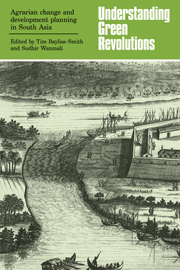Preface
Published online by Cambridge University Press: 25 May 2010
Summary
This volume is a tribute by his students and colleagues, to B.H. Farmer on his retirement as Reader in South Asian Geography and Director of the Centre of South Asian Studies in the University of Cambridge. The essays it contains are evidence of the esteem and affection in which he is held. Moreover their content bears the stamp of his critical and encouraging guidance. It is not the function of a preface to enlarge upon them. They speak for themselves.
This is, however, an opportunity to record something of Farmer's influence on geographical studies in Cambridge. My first experience of his work came when I was asked to review his Pioneer Peasant Colonisation in Ceylon. Coming from East Africa where the term ‘dry zone’ would be interpreted as an area with an uncertain rainfall averaging perhaps 400 mm a year, I was immediately struck by his use of ‘dry zone’ to embrace areas with a very high (though seasonal) rainfall. It was an indication of his powers as a writer and a teacher that I found his exposition conclusive, and thereby widened my concept of the relations between climate, season and soil.
I regarded Farmer at that time as a specialist on Sri Lanka. The opportunity for him to widen his horizons, and to develop research and teaching interests throughout the subcontinent of India, came in 1961 with the allocation to Cambridge University of resources to develop modern studies of some of the major cultural regions of the world. To Ben Farmer fell the task of establishing the Centre of South Asian Studies.
- Type
- Chapter
- Information
- Understanding Green RevolutionsAgrarian Change and Development Planning in South Asia, pp. ix - xPublisher: Cambridge University PressPrint publication year: 1984



